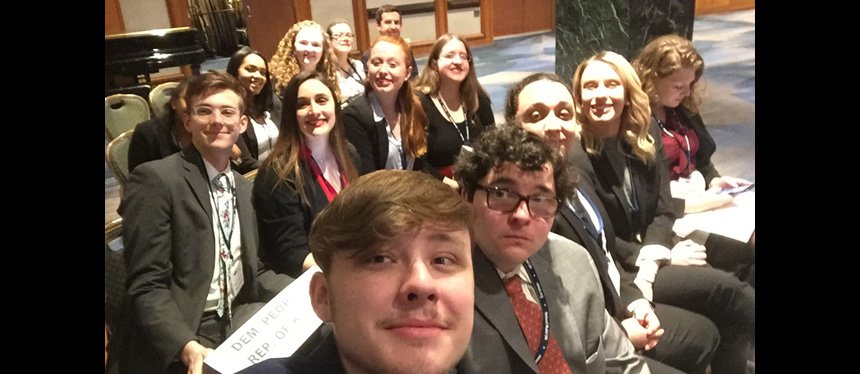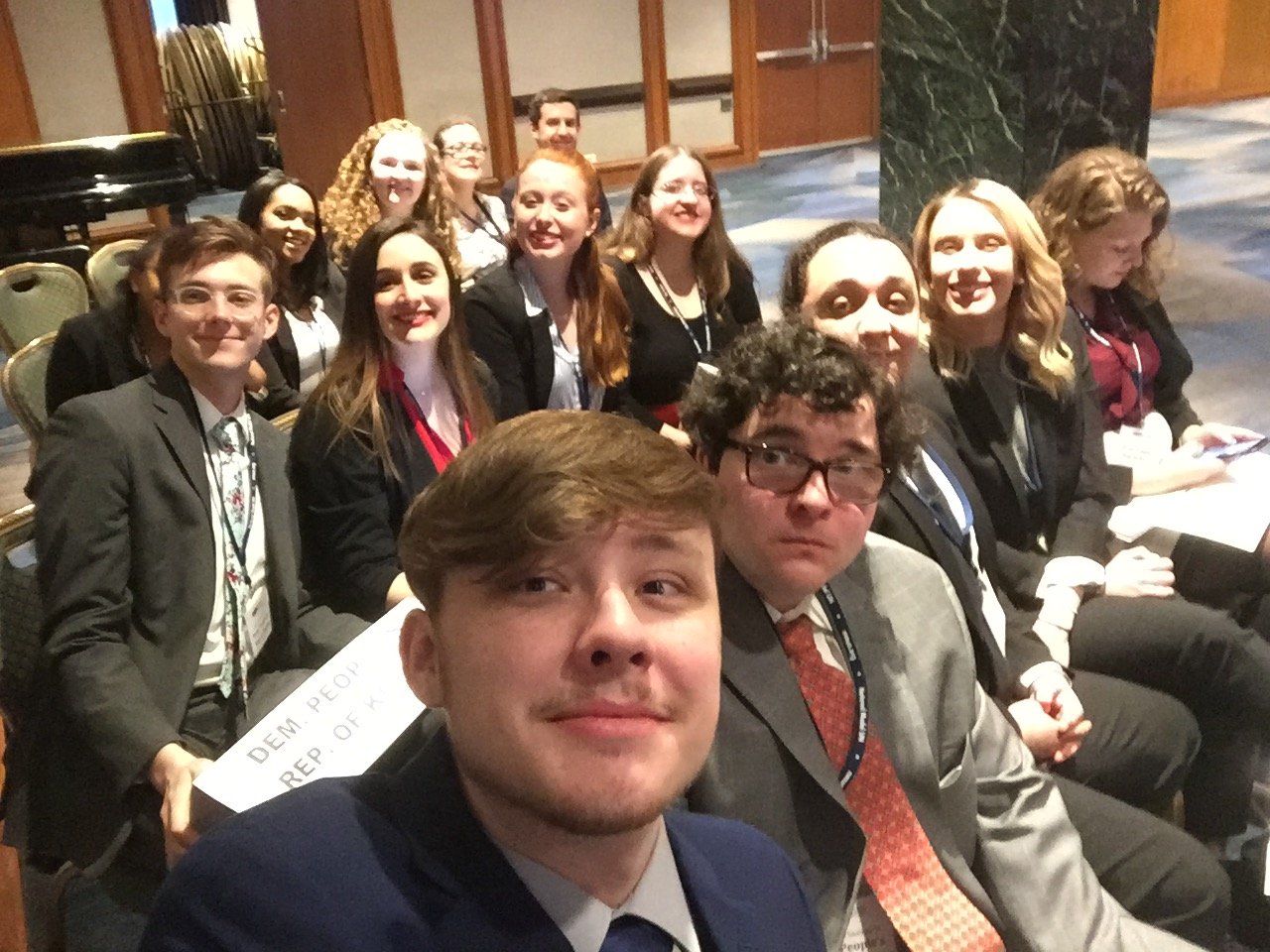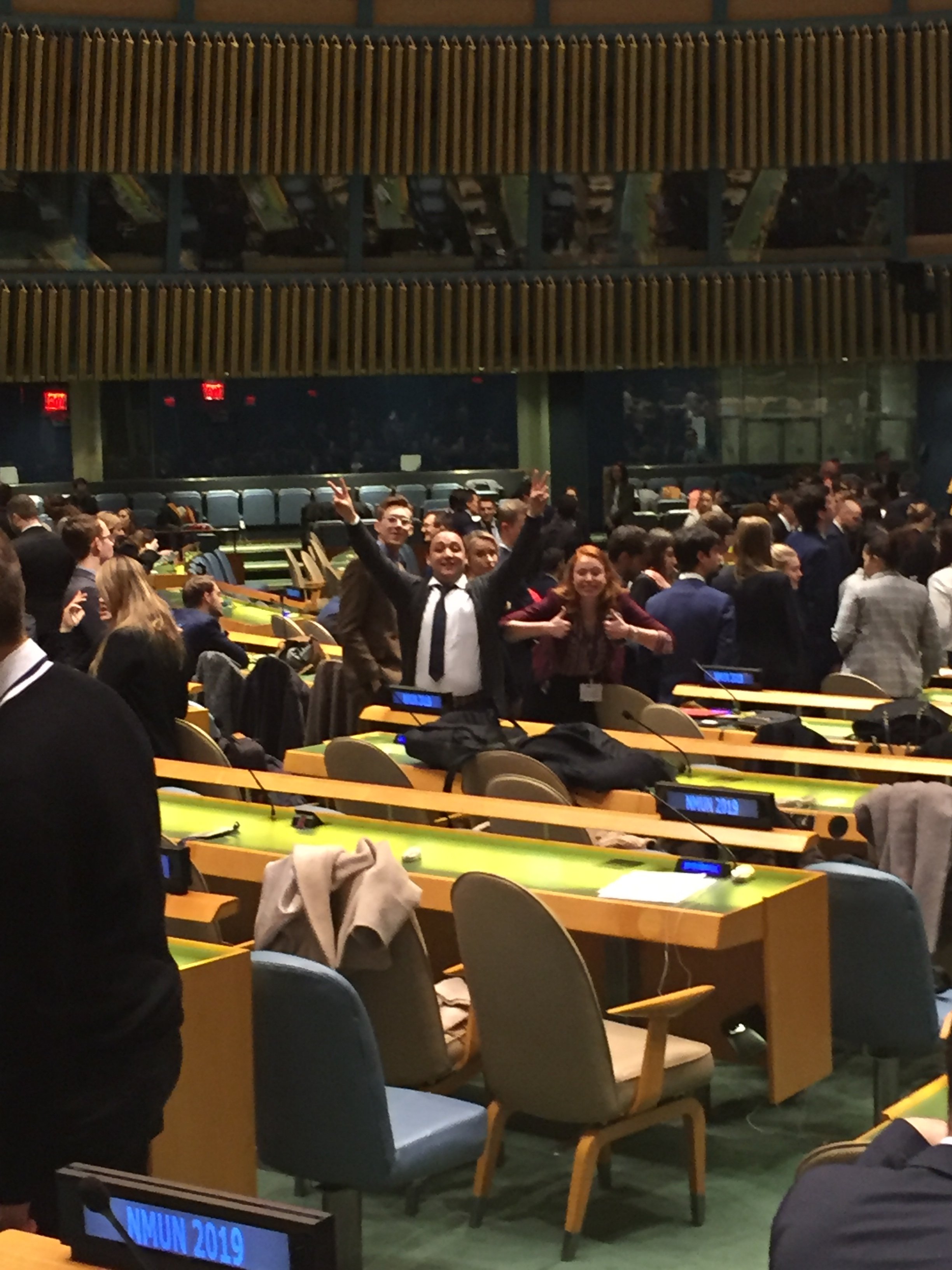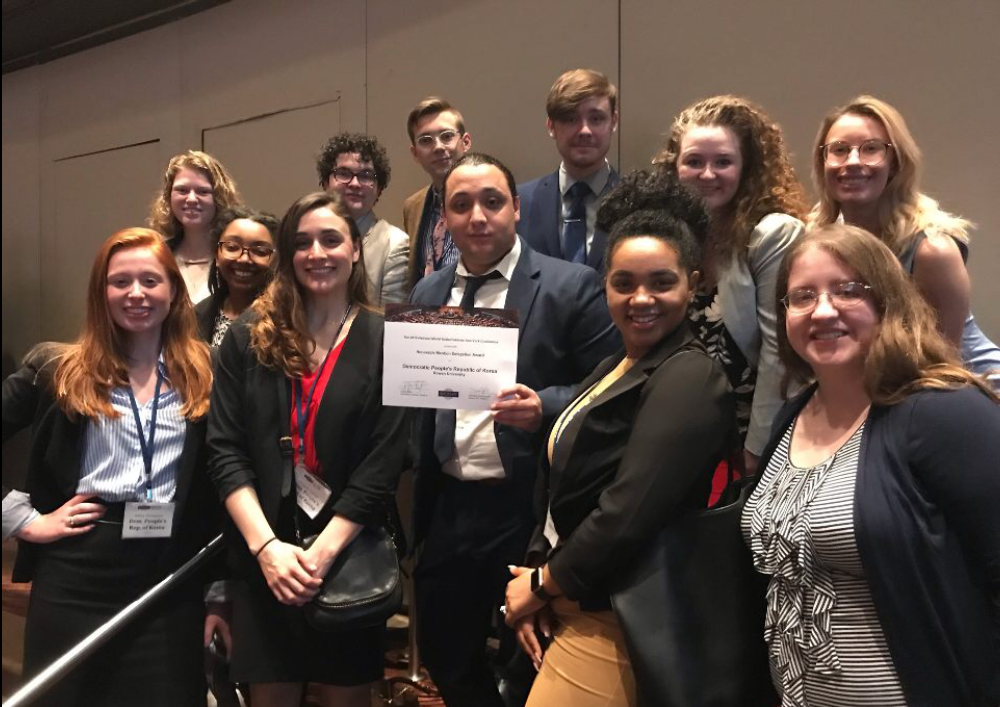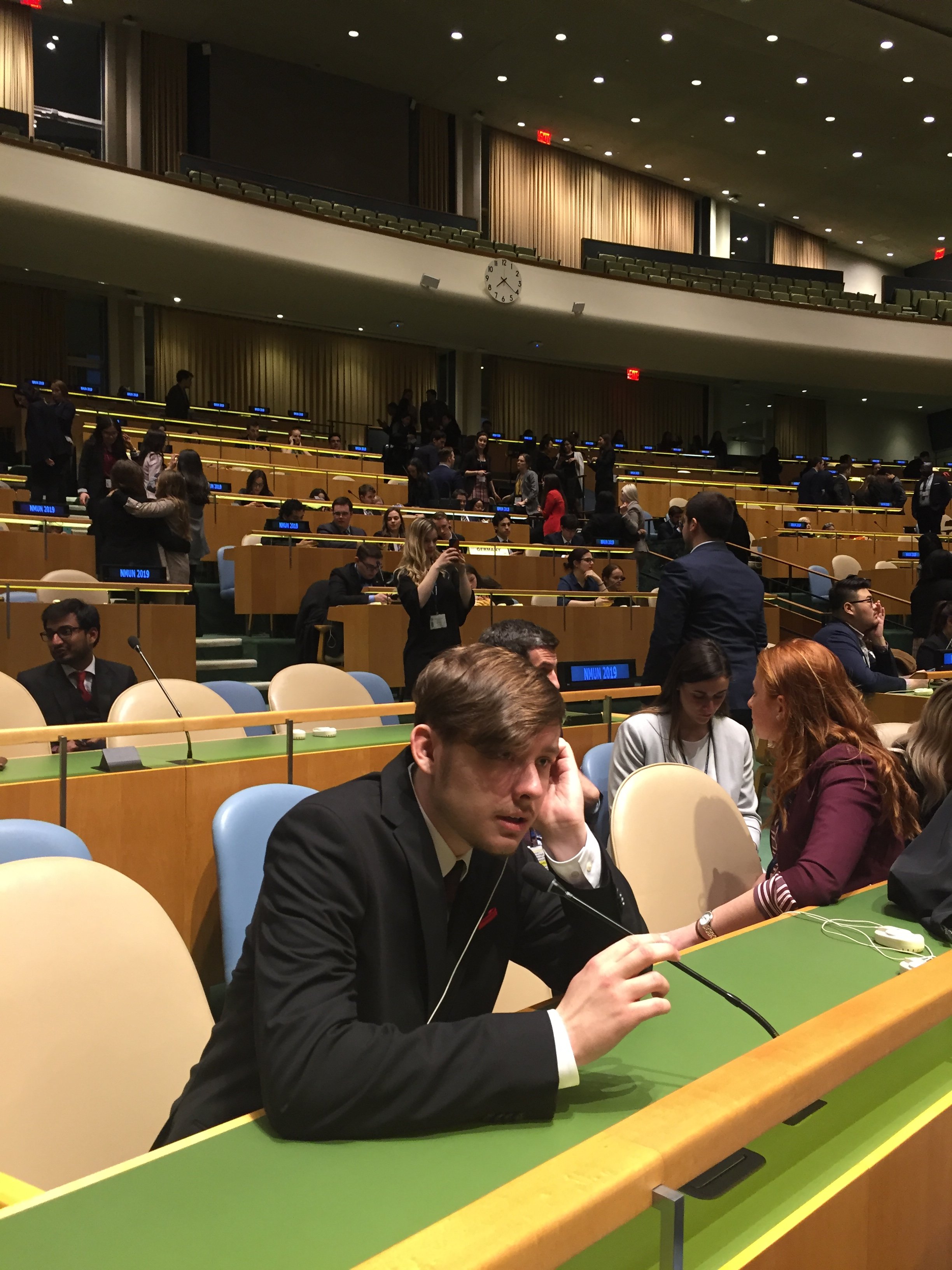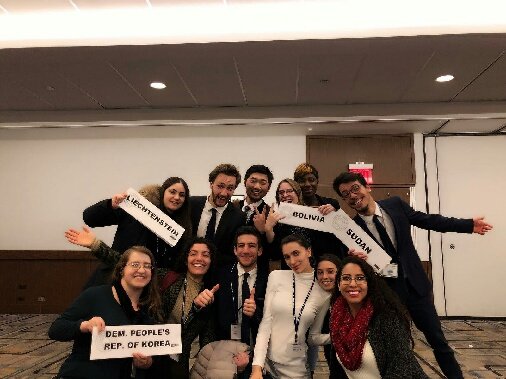Model UN
Model UN
Model UN
Spring 2019 welcomed an exciting new course to the College of Humanities and Social Sciences. For the first time, Rowan University students had the opportunity to take part in Model United Nations, a course taught by Dr. Michael Smith. In March, class members participated in the National Model United Nations conference in Manhattan. Post-conference, the class conducted a presentation on Wednesday, April 24 about their experience. The twelve students were still buzzing from their week of simulated diplomacy, and winning an Honorable Mention for their work. Less than 20 percent of the schools that attend the National Model United Nations are awarded at the conference, making the recognition especially exciting. The class represented the Democratic People’s Republic of Korea and had plenty to say about the experience.
What kind of preparation went into classes prior to the Model U.N. conference?
“It’s a blend of regular class and collaborative work to get ready for the conference.” -Jacob Haulenbeek
“We went over a lot about the different committees and their roles. We did our position papers . . . and retouched them after they were written. We read about North Korea a lot, their history and their background. We had to have a good foundation of their views, especially on the issues that we were assigned.” -Bridgette Draham
“It involves learning the structure and history of the United Nations. It involves learning the history of the country that they are supposed to be representing at the conference, in this case, the Democratic People’s Republic of North Korea . . . and putting those things together to be able to work at the conference to try and defend what they understand North Korea’s state interest to be. So that’s a lot to put into a few weeks, but I have to say, they did pretty well.” - Dr. Michael Smith
What were days like throughout the conference?
“In the beginning, they had the U.N. General Assembly President there, and it was pretty cool because I had never actually seen anyone from the U.N. speak before.” -Vanessa Washington
“We would gather in our committees and people would give speeches for the formal session. Then there would be informal sessions where we get together to draft resolutions and come up with solutions for the issues that were at hand.” -SirMichael Cianci
“You learn about the bad parts too, like the bureaucracy and the slowness, but really everyone was just so excited and willing to work together. It was so nice.” -Elizabeth Mosolovich
What was it like representing The Democratic People’s Republic of Korea?
“Being a different country and having a different perspective, you have to force yourself to not think in the mind of a person from the U.S. It was really cool to kind of view it through a different lens.” -Ashley Hermansen
“It was easy because it was antithetical to the United States most of the time. For other countries I think the lines blurred a little bit. We had to literally do the opposite of what we really felt.” -Jacob Haulenbeek
“It was kind of like you were an actor in this play . . . You learn the issues better that way. It’s seeing things from a new point of view, and that’s important in life, but especially in international relations, because there is so many different countries, and so many different interests and opinions.” -Elizabeth Mosolovich
What were the most memorable moments from the Conference?
“I liked the negotiations, there was a working paper that was going to be a draft resolution, Bridgette and I were doing a really good job of making people want it. Eventually it fell apart, but Bridgette and I were completely on the same page, we discussed it before, and we were shutting everything they said down. It was really great, and they were sweating, and people were talking up their side and stuff . . . but, we ruined their day in a good way.” -Jacob Haulenbeek
“There were just so many different people from so many different parts of the world, and it was really cool just talking to everybody.” -Elizabeth Mosolovich
“My favorite moment was the last time we had functional meetings. My working group had a lot of revisions to do, we were trying to merge a bunch of papers and we basically took a power lunch. Everybody came from a different country, I was the only American there . . . It was just this international collaboration, with all these students just putting aside their differences, and getting their paper done. It was just a great experience.” -Maximillian Santiago Jr.
What was it like earning an honorable mention?
“I felt like an underdog almost. I can’t speak for the larger committees, but I know we were one of the only groups that were first-timers. It was definitely feeling like you’re thrown in with the sharks, so I was very happy to find out at the end that we had actually been recognized”. -Maximillian Santiago Jr.
“It felt pretty good, I didn’t think we were going to get anything seeing that it was our first time and we were North Korea, which wasn’t the easiest country to represent. I thought our group did a really good job of trying to work together and coordinate.” -Vanessa Washington
“We were really surprised, but I think we all knew we did good work . . . schools have been veterans there for much longer than us and being in that top percent was awesome and really surprising.” -Leo Fasolo
What would you tell someone considering taking the course?
“I think for students, this offers a hands-on experience where they can really learn both the value and the practical application of international cooperation, so I think it’s a fantastic course to build your academic career, but also to build your understanding of the world around you.” -Maximillian Santiago Jr.
“I keep saying this, but it just made my heart happy, I just felt so fulfilled and so excited to be there and to be in that atmosphere. I think it was just so surreal to actually be in the conference . . . You can just feel all the energy, and you still felt like you were making a difference.” -Ashley Hermansen
“It’s a performed class, and through the performing and acting in those roles, you understand the struggles that are necessary for diplomats to go through to actually come out on the other end with some sort of policy, and it requires a much deeper level of understanding. If a student were considering it I would say, look at the Model U.N. website, look at information from Rowan’s perspective. But if you have any interest in international relations and international laws, U.N. system, any of that, just sign up and see where it takes you.” -Dr. Michael Smith
To learn more about the National Model United Nations, visit www.nmun.org.
